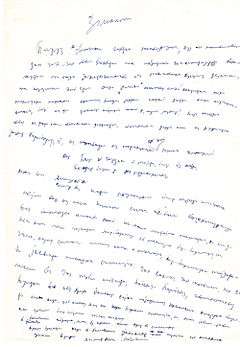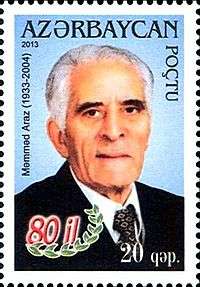Mammad Araz
| Mammad Araz | |
|---|---|
|
Mammad Araz on Azerbaijani stamp | |
| Born |
Mammad Ibrahimov October 14, 1933 Nursu, Nakhchivan, Azerbaijan SSR, USSR |
| Died |
December 1, 2004 (aged 71) Baku, Azerbaijan |
| Occupation | Poet |
| Language | Azerbaijani |
| Ethnicity | Azerbaijani |
| Genre | Poetry |
| Notable works |
|
Mammad Araz (Azerbaijani: Məmməd Araz) (14 October 1933 in Nursu, Nakhchivan – 1 December 2004 in Baku, Azerbaijan), born Mammad Ibrahimov, was an Azerbaijani poet. Araz, his pen name, identifies the river that became the border separating present-day Azerbaijan and Iran when Azerbaijan was divided more than 180 years ago.
Early life
In 1954, he graduated from Azerbaijan's Pedagogical Institute. Araz has also worked on the editorial offices of Maarif Publication House in Baku, Ulduz Magazine (1967–1970), Literature and Art newspaper (1970–1972) and Azerbaijan State Publication House (1972–1974). He has also worked long time as editor of "Nature of Azerbaijan" magazine since 1974.[1]
Poetry

He is also the author of "The World is Yours, The World is Mine" (Dunya Sanin, Dunya Manim) poem, which was lyrics of very popular music hit in Azerbaijan in 90s.

Some of Araz's famous works include:
- If There Were No War
- The World is Yours, The World is Mine
- The Sound Written on the Rocks
- Father of Three Sons
His works published in English by Betty Blair such as:
If There Were No War (1956)
- If there were no war,
- We could construct a bridge between Earth and Mars
- Melting weapons in an open-hearth furnace.
- If there were no war,
- The harvest of a thousand years could grow in one day.
- Scientists could bring the moon and stars to Earth.
Recognition
Araz has been recognized with the following awards: Honored Culture Worker of Azerbaijan (1978), Laureate of Republican State Award (1988) and "Istiglal" (Independence) Order.[2]
